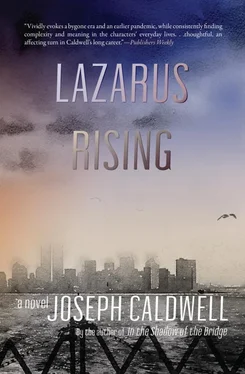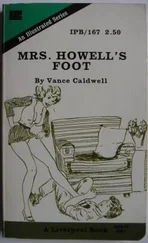Partly to give the man a chance to revel in the exercise of his craft and partly to pay tribute to her mother’s gambling instincts, Dempsey sat and pretended to ponder. With a show of innocence, she said perhaps a trial would be the better resolution of the situation. The lawyer did not object; he even seemed to indicate that he would be guided by nothing but her wishes. Then he mentioned, in passing, a man who had seen her mother stagger out into the street, not in the crosswalk but from behind a parked car. The limousine had tried to stop, but the lurch was too sudden, out of nowhere. No other witnesses seemed available even though the death took place at nine-twenty in the evening, a time when Third Avenue is hardly a deserted byway. Clearly the lawyer had resources and was not hesitant to use them to the full advantage of his client.
Dempsey simply sat and continued her presumed pondering. She put her hand to her mouth, then to her cheek, then used it to prop up her chin. She examined her elbow, rubbed it, then crossed her arms and lowered her head. The lawyer watched closely, as if he would be required at any moment to repeat, in sequence, every move and gesture Dempsey was performing. Dempsey thought of staring at the ceiling, but that would be too obvious even for her, to say nothing of the lawyer. Even though she faltered, she knew that thinking of all her mother had wanted for her—a career as a working artist, to be loved unconditionally, to be solvent—would allow her to hang on in what was clearly a game. The lawyer finally mentioned seven hundred thousand. Dempsey felt that an even million would be the more accurate validation of her negotiating skills. Through an extended series of silences, gestures, and shifts of the buttocks, a figure of eight hundred thousand was agreed upon, each of them protesting that wrongful sacrifices were being made.
Dempsey was, in fact, annoyed with herself for lacking the patience and fortitude to go for the million—a figure her mother had struggled toward all her life, following the horses from one track to the next to the next, coming if not close at least within distance of palpable encouragement. A measure of her dedication found expression in Dempsey’s name. A tip from a friend one evening in the champion boxer Jack Dempsey’s restaurant had paid munificently enough for her mother to commemorate the event by giving her one and only daughter a somewhat singular name for a girl. The girl loved her name and was forever grateful.
Then, too, with an extended run of her luck, her mother had sent Dempsey to an upstate convent school for two years, and an initiation into the art of painting. If the nuns made little impact with religious instruction, the attraction of art was more than compensatory. If heaven had passed her by during the distribution of faith and hope and charity, compensation had been made when looks and talent were being handed out. She was, from the beginning, a beauty—and she accepted it calmly, even gratefully. During her stay at Mount St. Ann, her gift for art became increasingly apparent, especially to Dempsey herself.
(She had found herself very much attracted to Sister Sarah’s approach to painting. “To be an artist,” Sister had said, “you must love mystery. The true purpose of the real is to lead the way to mystery—which is the ultimate reality. The purpose of an objective painting is to show that way, the way to mystery. If it doesn’t, it’s merely illustration. An abstract painting must be the mystery itself. If it isn’t, it’s merely decoration.”)
When the eight hundred thousand was finally settled on, Dempsey was somewhat pleased that her mother’s final earthly act had ended in an actual gamble—one that paid off. The only indication of the lawyer’s feelings about the transaction was the repeated smoothing of his necktie. So involved was the good man in this gesture that Dempsey decided a handshake could be dispensed with. He was still soothing his tie when Dempsey left.
Dempsey’s descent into drugs was driven by her painting. Not that she was blocked. Far from it. In fact, never had she painted better; never had inspiration and revelation cooperated so completely. Her excitement was unending. She wanted nothing but to work, to paint. But the mind, the body, couldn’t keep up with her. Physical exhaustion would make its claims; mental fatigue, the refusal of the most common intellectual endeavor to go any further without intermission, would close down her mind, making it impossible for her to continue. But there was nothing she wanted to do until the intermission was over, whether it was an hour, an evening, a night, or whatever. She had concentration for nothing but her work. She wanted oblivion until the interval had ended. She wanted no life but painting. She wanted to be nothing and be nowhere unless she could pick up her brush and squeeze paint onto her palette.
She found the oblivion she so desperately needed in the Lunch Room, a communal neighborhood shooting-up gallery near the Financial District frequented mostly by Wall Street types—financiers, accountants, bankers, with a few lawyers and an occasional designer or decorator thrown in. There she could while away the unwanted hours. Except that, before she would admit to what was happening, the unwanted hours became the wanted ones, the painting abandoned, the unbearable excitements exchanged for even more unbearable cravings.
With the drugs, mostly main-line heroin, Dempsey became promiscuous—not because of an increased passion but because of a kind of indifference. If someone wanted to have sex with her, she knew of no reason to refuse. Without any sort of preference, she had no criteria for accepting or refusing. She was young, unable to judge for herself, she accepted the compliments that she was beautiful. It had occurred to her more than once that the men who approached her were motivated not by any great desire but by a wish to proclaim a conquest. They wanted credit for having seduced a beautiful young woman more than they wanted the woman herself.
When she began to have nausea as well as unusual fatigue, Dempsey went to see her mother’s physician, who ran some tests and told her she was pregnant. The news was a shock, but then she held firmly that for the sake of her unborn child, she would immediately make her recovery from drugs unaided. She would not even resort to the substitute legal drugs that might have eased her return to sobriety. Those, too, she felt, would affect the baby. What pangs and terrors of withdrawal she might experience would have to be considered symptoms of her pregnancy. The nausea, the cramps, the high-pitched voices she could hear scratching faintly in the walls—these were what a woman in her third month had to expect. When the shadows advanced toward her, when her body became giddy with fear, she would explain to herself that she was pregnant and all this would pass once the baby was born.
But the baby lived fewer than six hours.
To explain the child’s death, the doctor reminded her of the HIV test she’d agreed to during her pregnancy. She had no memory of it. He reminded her that she had tested positive. She had no memory of that either. But that, the doctor explained, had caused the premature birth and speedy death.
Dempsey turned to stone. She was infected. She’d infected her son. He had died. But she was living. And she would be living with that knowledge, a knowledge that she vowed would never be ignored.
More than three years after they had parted, Dempsey and Johnny ran into each other on a brisk Saturday morning in the fall, on Church Street. Johnny was walking down to the Staten Island ferry; Dempsey was going to her friend Winnie’s to see some of her new paintings.
Johnny saw Dempsey before she’d seen him and stopped. Dempsey noticed that a man headed toward her was now standing still, about fifteen feet away. When she saw that it was Johnny Donegan, she, too, stopped, but only for a moment, then continued toward him. He brushed his thumb across his chin, and then took the few steps that brought the two of them within about three feet of each other. Again they stopped. Both tried a twitching smile, then just stared.
Читать дальше











